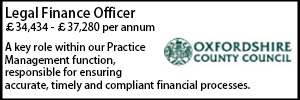Selling local authority legal services
- Details
 Tiffany Cloynes and Clare Hardy examine how local authorities can go about generating additional income by selling their legal services.
Tiffany Cloynes and Clare Hardy examine how local authorities can go about generating additional income by selling their legal services.
As local authorities strive to manage their limited resources, whilst delivering high quality services and meeting the needs of their communities, it is important for them to take every opportunity to generate income for them to use. There are plenty of opportunities, but these come with legal obligations and constraints and it is important for local authorities to comply with these and act lawfully.
Local authorities should ensure they make full use of their charging powers. A key power is section 93 of the Local Government Act 2003, which allows local authorities to charge for the provision of discretionary services. When using this power, a local authority must ensure that the income received from the services does not exceed the cost of provision. This power will therefore not bring in extensive income, but if a local authority calculates the cost of service provision effectively, it can help with the cost of ensuring that services are underpinned by an effective infrastructure.
Local authorities have a wide range of powers to carry out a range of activities which may result in income generation, even though this is not the local authority’s purpose. They also have power under the Local Authorities (Goods and Services) Act 1970 to trade with other public bodies, by entering into agreements for the provision of goods and services and agreeing appropriate terms as to payment.
However, if local authorities intend to trade with the private sector and to use their powers for a commercial purpose, they would be obliged by law to act through a company. It is therefore crucial that a local authority should identify its purpose for carrying out any activity and that it should make appropriate arrangements to reflect that purpose.
A local authority should have a clear business plan when it markets its services. The local authority needs to be aware of the practicalities of bidding for work and should ensure that it allocates sufficient resources to this. It needs to identify its unique selling point and any competitive advantages or disadvantages it may have. A local authority also needs to ensure that everyone within the local authority understands the objectives behind selling the local authority’s services, so that the culture within the local authority supports these objectives.
Particular care is needed if a local authority intends to provide legal services. As well as the need for local authorities to act within their powers, local authority solicitors need to ensure they comply with the requirements of the Legal Services Act 2007. That Act requires persons to be authorised by an approved regulator or to be covered by an exemption before they may carry our “reserved legal activities” as defined by the Act. Local authorities are usually outside these constraints by virtue of section 15 of the Legal Services Act 2007, which allows employees to provide legal services in the course of their employment without this amounting to the employer providing reserved legal activities.
However, this does not apply if a solicitor provides services to the public or a section of the public. Before making legal services available to others for a fee, local authorities need to consider whether this will involve the solicitors they employ in providing services to the public. Guidance from the Solicitors Regulation Authority suggests that the question to ask is whether the solicitor is providing services to their employer or a person connected with their employer. A key indicator will be how the recipient of the service approaches the solicitor. If someone engages a solicitor as a result of marketing or a haphazard approach, this is likely to be regarded by the SRA as the provision of services to the public. This is not likely to be the case if services are provided to a closely defined group with a relationship with the local authority.
Local authorities should have strategies to help them generate income effectively. A comprehensive income generation activity will identify all opportunities and set out plans to bring these into effect. It will identify any legal requirements and how the authority will comply with these and any risks and how the local authority will address these. It should set out the business case for any proposed income generation activities and a business plan to bring these activities forward.
Tiffany Cloynes is a partner and Clare Hardy is a professional support lawyer at Geldards.
Senior Solicitor - Property
Legal Director - Government and Public Sector
Head of Legal Services / Deputy Monitoring Officer
Legal Officer
Locum roles
 Court of Protection Property and Financial Affairs Webinar Series: Contested Statutory Will Application - 39 Essex Chambers
Court of Protection Property and Financial Affairs Webinar Series: Contested Statutory Will Application - 39 Essex Chambers
02-03-2026
Online (live)
 Housing and Homelessness Conference - Birmingham 2026 - 4-5 Gray's Inn Square
Housing and Homelessness Conference - Birmingham 2026 - 4-5 Gray's Inn Square
03-03-2026 9:30 am
East Midlands
 Law Enforcement Data Processing and Part 3 of the DPA 2018 - Act Now
Law Enforcement Data Processing and Part 3 of the DPA 2018 - Act Now
05-03-2026 10:00 am
Online (live)
 Cross-Border Placements of Children - Justin Gray, Trinity Chambers
Cross-Border Placements of Children - Justin Gray, Trinity Chambers
05-03-2026 3:00 pm
Online (live)
 The Case for Ecocide Law: In Conversation with Gerard Forlin KC and Jojo Mehta - Cornerstone Barristers
The Case for Ecocide Law: In Conversation with Gerard Forlin KC and Jojo Mehta - Cornerstone Barristers
05-03-2026 5:00 pm
London
 Grappling with S73 - variations of conditions applications or appeals - Ivy Legal
Grappling with S73 - variations of conditions applications or appeals - Ivy Legal
09-03-2026
Online (live)
 HMPL Building Blocks: Tenancy Management – Assignment, Mutual Exchange and Succession - Devonshires
HMPL Building Blocks: Tenancy Management – Assignment, Mutual Exchange and Succession - Devonshires
12-03-2026
Online (live)
 AI and Information Governance: Bridging Innovation and Compliance - Act Now
AI and Information Governance: Bridging Innovation and Compliance - Act Now
12-03-2026 10:00 am
Online (live)
 Damages and other remedies in claims against HE institutions - 3PB
Damages and other remedies in claims against HE institutions - 3PB
12-03-2026 11:00 am
Online (live)
 Housing Act 2004 & the Private Rented Sector – where are we now? - Cornerstone Barristers
Housing Act 2004 & the Private Rented Sector – where are we now? - Cornerstone Barristers
16-03-2026 11:00 am
Online (live)
 Property Law Nuts and Bolts webinar series - Forfeiture - Landmark Chambers
Property Law Nuts and Bolts webinar series - Forfeiture - Landmark Chambers
17-03-2026
Online (live)







































































































































 The SEND White Paper: the legal perspective - Landmark Chambers
The SEND White Paper: the legal perspective - Landmark Chambers  The General Data Protection Regulation - Act Now
The General Data Protection Regulation - Act Now  Data protection Conference - Hugh James
Data protection Conference - Hugh James  Contract modifications under the Procurement Act 2023 - DWF
Contract modifications under the Procurement Act 2023 - DWF  Certified Data Protection Officer Training (CDPO) - The Training Centre
Certified Data Protection Officer Training (CDPO) - The Training Centre 